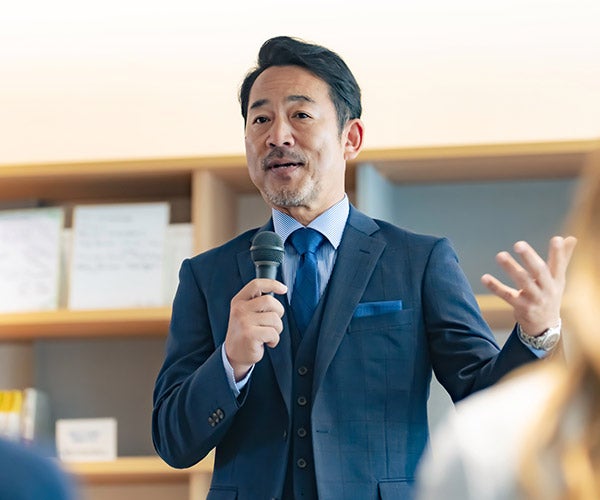Why study the Master of International Relations with UTS Online?
Top 100 University Globally1
Australia's Top Performing Young University2
Top 10 in Australia for graduate employability3
5 star rated for excellence across 8 categories4
1QS World University Rankings, 2026. 2Times Higher Education Young University Rankings, 2025. 3QS Graduate Employability Rankings, 2024. 4QS Stars Rating 2021–2024.
Your passport to global influence
In today’s interconnected world, a deep understanding of international relations is essential for professionals who want to shape a more equitable and sustainable global future. The UTS Online Master of International Relations is designed for forward-thinking individuals ready to move beyond theory and gain the practical knowledge and analytical skills to navigate complex global systems and influence real-world outcomes.
Through a future-focused and practice-oriented curriculum, you will develop a strong global perspective by exploring diplomacy, international policy, global communication, geopolitics, sustainability and international crime prevention. You will strengthen your ability to think critically, act ethically and engage with confidence across borders and cultures.
This course allows you to customise your learning journey with specialisations in Business, Health, Strategic Communication, Sustainability or Technology Management. You can also tailor your expertise by selecting elective subjects across these areas to align with your professional interests and career goals.
Delivered 100 per cent online, the Master of International Relations provides the flexibility and support to balance study with work and personal commitments. Guided by leading academics and industry experts, you will gain the skills, perspective and confidence to lead with purpose and impact in an increasingly connected world.
Who is this course for?
The Master of International Relations is designed for professionals who are ready to shape global affairs and make an impact on the world stage. It equips students with the analytical skills and strategic knowledge to navigate complex international systems, influence policy and lead with purpose across diverse industries and sectors.
Whether you want to advance in government, transition into a values-driven career or lead within an international organisation, this course offers the practical insight and global perspective needed to succeed in an interconnected world.
This course is suited to:
- Government and policy professionals seeking to influence international relations and global governance.
- Diplomats and foreign affairs specialists looking to strengthen their expertise in international negotiations and diplomacy.
- NGO and humanitarian workers aiming to contribute to global development, human rights and policy advocacy.
- Business and trade professionals wanting to expand their understanding of global markets, cross-border relations and international trade.
- Academics and researchers focused on global politics, security studies and international law.
- Career changers and professionals from politics, journalism or corporate sectors looking to pivot into, or advance within, global policy, diplomacy or advocacy.
See entry requirements under course information for more eligibility information.
What you will study
The UTS Online Master of International Relations comprises 12 subjects (72 credit points [CP] in total), with 9 core subjects and 3 electives.
Complete the following subjects:
- Intercultural and International Communication
- The Future of the International Order
- Sustainability and Global Governance
- Reframing International Political Economy
- The Asia-Pacific in the 21st Century
- Geopolitics and Australian Foreign Policy
- Global Crime, Justice & Security
- Research Design and Methods in International Relations
- International Relations Applied Research Project
Note: Most UTS Online subjects are valued at 6 credit points each. For detailed subject descriptions and further information, please download a course guide.
Flexible course options
The Master of International Relations comprises 12 online subjects (72 credit points (CP) in total).
Students who complete the Graduate Certificate in International Relations may qualify to advance to the Master of International Relations, requiring only 8 additional subjects to complete the Master's degree.
Applicants who do not meet the entry requirements for the Master of International Relations may use the successful completion of the Graduate Certificate in International Relations as a pathway, provided they meet the specific entry requirements.
Graduate Certificate
4 Subjects | 8 months
Or continue studying
Master's
+5 Subjects | 3 Electives | 24 months
Graduate with a Master's degree
One of our Student Enrolment Advisors can assist you with more information, including alternative pathways.
Learning outcomes
Navigate global political and cultural landscapes
Develop the expertise to engage effectively across diverse cultural and geopolitical contexts. Strengthen your ability to think critically and creatively about complex international issues and make informed decisions that shape global outcomes.
Lead with ethical and socially responsible practices
Critically assess sustainability practices, Indigenous research methodologies and ethical considerations in international contexts. Advocate for socially responsible and inclusive policies that contribute to positive change in Australia and around the world.
Apply advanced research and analytical skills
Master qualitative and quantitative research methods to interpret data, evaluate policy and address complex global challenges. Use analytical techniques to deliver evidence-based insights that inform international decision-making and build high-demand skills in data analysis and project management.
Communicate and collaborate across global networks
Refine your ability to communicate with influence and clarity through policy briefs, presentations and simulations. Develop the confidence to collaborate across cultures, engage diverse stakeholders and lead initiatives that make a meaningful impact in global affairs.
Course information
Entry requirements
Applicants must have one of the following:
- Completed Australian bachelor’s honours degree, graduate diploma, graduate certificate, master's degree or doctorate, or overseas equivalent, in any field of study
OR
- Completed Australian bachelor's degree, or overseas equivalent, in Management and Commerce, Society and Culture, or Creative Arts
OR
- Completed Australian bachelor's degree, or overseas equivalent, in any field of study AND A minimum of 2 years full-time, or equivalent part-time, relevant professional work experience#
#Relevant professional work experience is defined as employment within OSCA groups: 01 Managers and 02 Professionals.
Applicants who do not meet the criteria above should consider applying for C11374 Graduate Certificate in International Relations.
Supporting documentation to be submitted with the application
For applicants who need to demonstrate professional work experience:
- Curriculum Vitae AND Statement of service in one of the following formats:
- A 'Statement of Service' provided by the employer
- A completed 'UTS statement of service’ signed by the employer
- A statutory declaration confirming professional work experience (Australian residents only)
- An official letter from the applicant’s accountant or solicitor, on company letterhead, confirming the applicant’s professional work experience or engagement with the business, duration of operations, and nature of the business
- A business certificate of registration in original language and English (e.g. provision of ASIC documentation or ABN or similar documentation for Australian Businesses)
Eligibility for admission does not guarantee an offer of a place.
Want to check your eligibility?
Not only do we have the right tools and support teams to help you – we have people who care about your success.
Career outcomes
The UTS Online Master of International Relations prepares professionals to navigate the complexities of global politics, diplomacy and international affairs. Designed for those passionate about driving change on a global scale, this course equips you with the knowledge and skills to influence policy, foster international cooperation and address global challenges.
Upon completion, graduates can explore a range of career opportunities, including:
- Policy Advisor
- International Affairs Specialist
- Diplomatic Officer
- Global Development Manager
- Humanitarian Program Coordinator
- Trade and Investment Analyst
$90,000
Average salary
Graduates with a Master of International Relations in Australia earn an average starting annual salary of $90,000, highlighting the financial rewards of this qualification.
(Indeed.com)
Expanding strategic focus on international engagement in Australia
Australia maintains over 170 diplomatic posts worldwide and directs around 75% of its international engagement and development efforts toward the Indo-Pacific, underscoring the growing importance of expertise in diplomacy, regional security and global cooperation, key capabilities developed through studying International Relations.
(Department of Foreign Affairs and Trade)
Diverse career paths
Graduates with a Master of International Relations can secure roles across diplomacy, policy analysis, international development and corporate consultancy. Career pathways span government agencies, non-governmental organisations (NGOs), global institutions and multinational corporations, reflecting the high demand for professionals with expertise in global affairs.
(Indeed.com)
Upcoming intakes
UTS Online courses have 6 intakes per year. The diagram below shows all upcoming intakes. Our next intake is highlighted below.
-
Jan
2026 -
Mar
2026 -
May
2026 -
Jun
2026 -
Aug
2026 -
Oct
2026
Meet our Course Coordinator
Understanding International Relations has never been more important in today’s interconnected and interdependent world. We have developed this course to equip you with practical skills in research, policy, and global analysis to thrive in your chosen field, whether that is diplomacy, international business, the United Nations, public service, development, or the humanitarian sector. This program is designed to assist you in taking the next step in achieving your goals and developing as a leader in a globalised world.
Dr Caitlin Biddolph, Course Coordinator, Master of International Relations
Download a course guide
Download a course guide to explore detailed subject descriptions, entry requirements, pathway options and fee information.
Frequently asked questions
UTS Online's Master of International Relations has been designed with career outcomes in mind and prepares students for diverse roles in a range of settings. Graduates can explore roles as Diplomats/Foreign Service Officers, International Relations Analysts, International Development Specialists, International Trade Specialists, International Business Consultants, Intelligence Analysts, Political Risk Analysts, Humanitarian Aid Workers, United Nations Officers or International NGO Program Managers. The versatile skill set gained through this qualification equips individuals to navigate various sectors and make a meaningful impact on a global scale.
The Master of International Relations offers two specialisations:
-
Sustainability
-
Technology Management
Alternatively, the ‘Flex’ option allows you to customise your degree by selecting three electives from across the specialisations. These options empower you to align your studies with your career aspirations.
The UTS Online Master of International Relations can be completed in as little as two years part-time. If needed, you can apply for a Leave of Absence (LOA) through the My Student Admin Portal, which may extend your study duration.
While UTS Online does not offer an official accelerated double Masters degree in International Relations and Strategic Communication, it is possible to complete both degrees in a reduced timeframe.
Students who complete the Master of International Relations with a stream in Strategic Communication may apply for the Master of Strategic Communication and seek Recognition of Prior Learning (RPL) for the following subjects:
-
992230 Intercultural and International Communication (6cp)
-
Strategic Communication 18cp stream
If approved, you will need to submit an RPL application with supporting documentation to have the credits applied. For further details, visit the Recognition of Prior Learning webpage or speak with a Student Enrolment Advisor.
No, but you may be eligible for entry to the Graduate Certificate in International Relations, which can serve as a pathway into the Master of International Relations. Read the admission requirements of the Graduate Certificate to check your eligibility and contact a Student Enrolment Advisor on 1300 477 423 to talk through any questions.
Yes, UTS Online offers two courses in International Relations:
-
The Master of International Relations
-
The Graduate Certificate in International Relations
If you complete the first eight subjects of the Master of International Relations but are unable to continue, you may exit with a Graduate Diploma in International Relations.
Throughout the Master of International Relations at UTS Online, you’ll receive robust support, including:
-
Feedback from teaching staff
-
Peer engagement through online discussions
-
Interactive activities to enhance learning
We are committed to your success and offer multiple opportunities for academic guidance.
A Master of International Relations can be worth it for people who want to deepen their understanding of global politics, diplomacy, international security, foreign policy, political economy, human rights and justice. It is often chosen by those who want to work in international engagement, government policy, research, global development or organisations that operate across borders. An international relations degree can also strengthen analytical, communication and negotiation skills relevant to global careers.
The UTS Online Master of International Relations provides an example of how postgraduate study can support pathways into roles in government, NGOs, consultancy, foreign affairs and international organisations.
People with an international relations degree often work in roles such as policy officer, research analyst, diplomat, consultant, intelligence or defence analyst, NGO coordinator, program manager or international development specialist. Career opportunities span government agencies, global organisations, international NGOs, research institutes and private-sector firms with international operations.
The UTS Online Master of International Relations is designed to support entry into these types of roles by strengthening skills in diplomacy, research, policy analysis and understanding global systems.
Yes. An international relations degree is highly recognised because it develops skills in policy analysis, global systems, diplomacy, critical thinking and cross-cultural communication. These capabilities are valued in government, international organisations, NGOs, think tanks, research bodies and global business. The degree is seen as academically rigorous and relevant to real-world global challenges.
A recognised qualification such as the UTS Online Master of International Relations can further strengthen credibility by providing advanced training in diplomacy, international policy and strategic global engagement.
Political science examines political systems, behaviour, institutions and governance at local, national and international levels. It looks broadly at how political decisions are made and how societies organise power. An international relations degree focuses more specifically on global dynamics, including diplomacy, foreign policy, security, global institutions, conflict and cooperation between states and international actors. In that sense, International Relations is considered a specialised branch of political science with a global lens.
The UTS Online Master of International Relations builds expertise in global engagement, diplomacy and international systems, offering a focused study pathway for learners who want to specialise beyond broader political science.
Assignments in our subjects are authentic, relevant and often grounded in your personal clinical context. They vary according to the subject and include, but are not limited to clinical reports, posters, online quizzes and vivas (oral assessment), podcasts, recorded presentations, education tools, proposals, protocols and professional portfolios. You will not be required to complete exams or group assignments to graduate the Master of International Relations.
When you enrol in the Master of International Relations at UTS Online, you’ll gain access to a flexible and engaging online learning platform. Highlights include:
-
Interactive tools for exploring global challenges and diplomacy case studies
-
Flexible schedules designed for professionals balancing work and study
-
Access to video tutorials, peer collaboration, and academic resources
Watch this video example showcasing the platform’s features and tools.
For practical advice on managing your time and staying motivated, click here. Our team is here to support you throughout your studies.









